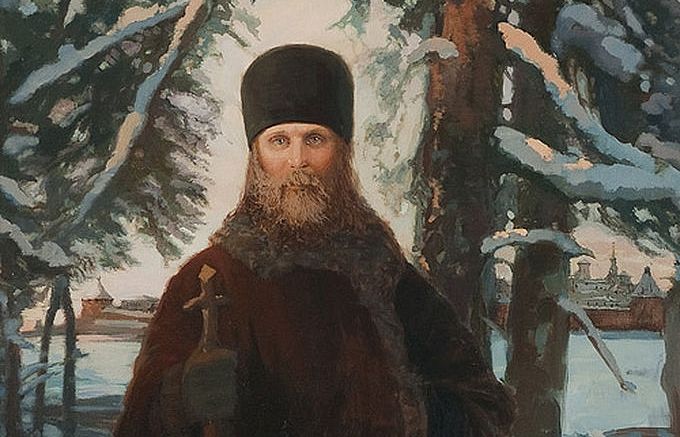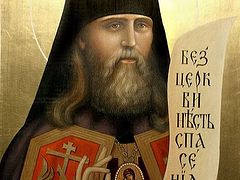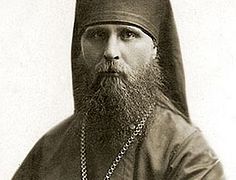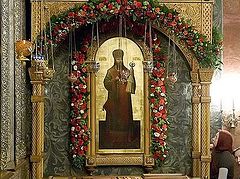 Holy Hieromartyr Hilarion on Solovki (fragment). Artist: Svetlana Ivleva
Holy Hieromartyr Hilarion on Solovki (fragment). Artist: Svetlana Ivleva
There are people on earth who are bearers of triumphant Chrsitianity,
always joyful, always with Paschal hymns on their lips,
and their faces are like those of Angels.[1]
In Church circles, Orthodoxy is often portrayed as a system of bans. It is forbidden to curse, get drunk, smoke, fornicate, eat meat or milk products on fast days, work on feast days, along with a whole huge number of all sorts of “forbiddens”. Of course, all of these things—keeping the fasts, chastity, and piety—are all necessary components of Christian life. But if a series of bans becomes a life’s foundation and center, can we call it Christian? Wouldn’t our religiosity in that case more resemble Old Testament forms, and not the best ones at that?
Wouldn’t it be better to present Christianity from its positive side, from the side of what we can do, from the position of the prospects and horizons open to us? For example, in Christianity we can love God and neighbor, we can do good, be merciful, compassionate, and converse with God as with our own Father. We can allow ourselves to calmly endure humiliation and mockery without fear of being destroyed, because the Lord gives us firm hope and assurance that all those who are humiliated will be exalted. We can be freed from the slavery of the passions and enter into the freedom of the sons of God.
In this case all the necessary limitations of Christian life would be viewed as means to assist people in entering into divine joy, like steps upon the heavenly ladder that opens for us the path to communion with God. Probably this is that very repentance that the Lord calls us to, that very metanoia—changing of mind, of thoughts, of the consciousness, when a person understands that his main and basically only goal, immutable treasure, and inextinguishable joy can only be the Lord God Himself.
The joy that Christian saints had is immutable because it is founded not upon the sand of earthly passions and consolations, but upon the rock of divine love. That is why they could say after the apostle Paul, For I am persuaded, that neither death, nor life, nor angels, nor principalities, nor powers, nor things present, nor things to come, nor height, nor depth, nor any other creature, shall be able to separate us from the love of God, which is in Christ Jesus our Lord (Rom. 8:38–39).
A clear example of this spiritual joy is to be found in the life of Holy Hieromartyr Hilarion (Troitsky).
Even in his childhood, the future hieromartyr burned with love for his Mother Church, and he gave his whole life to its service, to bring home to his countrymen the simple thought that the Russian people’s main problem, which led them into catastrophe, is that they had forgotten Orthodoxy, and apostatized from God and His holy Church. But he did this not so much in the spirit of a reproach as of inspiration, to draw them to the path of true salvation.
One student recalled the then Archimandrite Hilarion when he was a teacher and inspector of the Moscow Theological Academy: “Hilarion had a grace-filled influence on me by his own personality—his straightforwardness, authority in standing up for his convictions, his exalted litugicizing, his energy and love for all that was dear and near to him—the Church, Russia, and the Academy. And his enthusiasm was infectious; it encouraged and strengthened those around him.”[2]
It must be noted that Fr. Hilarion’s joy of life was not the product of spiritual naiveté or ignorance, but was grounded in an unshakable patristic foundation: “Hilarion loved to say that to the same measure that a Christian should recognize his sins and grieve over them, he should also rejoice in God’s infinite mercy and grace, and never doubt or despair in his life’s podvig.”[3]
Moreover Fr. Hilarion did not consider good deeds or the fulfillment of Christ’s commandments to be hard pay for future blessedness, but that virtue itself is blessedness, just as crime is also its own punishment: “Just as sin is inextricably connected with its consequence—suffering, so is virtue bound up with blessedness. Virtue itself is blessedness. Let there never be any such mercinarism or bargaining in the matter of salvation! Like a tree that grows from a grain, blessedness grows from virtue, from man’s confirmation in God’s will and in goodness.”[4]
Because of this spiritual relationship between virtue and blessedness, even in his homilies at monastic tonsure ceremonies Archimandrite Hilarion (Troitsky) called upon all to “Rejoice!”[5] The podvig of monasticism is inescapably bound up with sorrows. Nevertheless, it also contains in its very self a reward for the labors borne, and a steadily growing blessedness that reaches is fullness in the future life, but already begins here, when the one who renounces the world receives an hundredfold now in this time, houses, and brethren, and sisters, and mothers, and children, and lands, with persecutions; and in the world to come eternal life (Mk. 10:30). Therefore: “When, on this path upon which you are now being confirmed, you have to suffer in your struggle with the passions—rejoice…”[6]
These thoughts remind us of the sayings of St. Ambrose of Optina on monasticism: “When Fr. Ambrose was asked…, what is monasticism? He answered, ‘blessedness’.”[7]
The young archimandrite’s conclusions were not detached reasoning but the awareness of patristic writings tested through personal experience. After his own monastic tonsure, Fr. Hilarion experienced a spiritual upliftment he had never felt before: “I can’t relate what I experienced, but afterwards I felt as though I had gotten younger, become like a boy. I spent five days of spiritual joy in the church… During the past days of my monasticism I have mostly experienced feelings of joy and peace of soul… Yes, business goes on as before, but there is a significant change in my own self. I would like to believe that this is the activity of a particular grace given to a monk… And one has only to admit that, “after all, there can’t be just one form of life for everyone.” I chose the one that both then and now seems to be the most suitable for me. Do not pity me, but rejoice with me—for I am now rejoicing. And what does Hilarion mean? Cheerful.”[8]
And this spiritual joy did not abandon the “soldier of Christ, Hilarion” throughout his life’s difficulties, even up to his martyric end.
The intense schedule of his academic service broke his physical health. He humbled himself and gave thanks to God: “I don’t complain, because a monk is an ecclesiastical thing. He has no personal life—he is alone. No matter where they send him, he has to take it up and work… Glory to God for all things!”[9]
The Bolsheviks put him in prison. The archimandrite, exhausted from his ceaseless labors, accepted this as a kind of vacation, almost a sanatorium: “I live like I did before; I’ve settled in here completely, as if that’s how it’s supposed to be. I’ve even put on weight here and feel well physically. In order to increase my blood circulation I have started going to work—for example, pumping water out of the prison basements. It’s good to spend some time in the open air and work your muscles a bit. They add a pound of bread for work. I am eating well currently, and time is passing imperceptibly. It’s even a pity that, for instance, books are ready slowly. Life is going on steadily, properly. If all of this were happening in a nice place, it would be a veritable sanatorium.”[10]
In his letters His Eminence Hilarion simply describes his exile to Archangelsk as if it were an extended vacation in comfortable conditions on the seaside (true, it’s a northern sea): “I have a small, totally separate room (six and a half by three and a half arshins [15 x 8 feet]), with a window on the sunny side overlooking an open yard. You could say that I live in the center of town… and ahead are whole months of free time—nice!”[11] “I am very content and happy that I live here. The main thing is that I have free time and books.”[12]
The soviet authorities sent Vladyka Hilarion for six months to the Solovki special purpose prison camp. Here the grandeur of his character reaches a legendary scope. “He was the most popular person in the camp, throughout all its social strata.” People responded to his talents and virtues with love, and not only his brother bishops and priests, but also ordinary prisoners, even criminals. And his case was something unheard of—he inspired involuntary respect even from the conveyance guards and camp authorizes, who always addressed Archbishop Hilarion in no other way than “Vladyka”.
“He is accessible to all, he is just like everyone else, it’s easy to be around him, to meet with him and talk. He was of the most ordinary, simple, and non-saintly appearance—that was what Vladyka was like. But behind this ordinary form of cheerfulness and worldliness one could gradually discover a childlike purity, great spiritual experience, kindness and mercy, a sweet indifference to material blessings, true faith, authentic piety, and exalted moral perfection—this is not to mention his intellectual conviction combined with strength and clarity. This form of ordinary sinfulness, foolishness for Christ, and a worldly façade hid his inner activity from others and saved him from hypocrisy and vainglory.”[13]
Despite the dreariness and uncertainty for the future during Holy Hieromartyr Hilarion’s final year on Solovki, in his talks one can hear, just as before, not only St. Ambrose’s “live and don’t moan,” but also St. John Chrysostom’s “Glory to God for all things.” “And so for these long years I have gotten used to things and live, not moaning. I don’t hope for the best, and don’t put away the worst. Whatever is God’s will for me, let it be so.”[14]
In the life of Holy Hieromartyr Hilarion one can see the embodiment of the counsel of that same St. Ambrose of Optina: “We should live on earth like a wheel that turns—as soon as one point touches the ground, all the others will unfailingly reach upwards.”[15] It was the same with St. Hilarion, regardless of circumstances that cast many of his contemporaries into despair and death. He never lost that Paschal joy, which he kept throughout his entire short but full life, because he drew that joy not from earthly events but from the inexhaustible source of divine Love Incarnate, the crucified and resurrected Son of God. “Filled with spiritual joy, O Hilarion, thou didst walk the narrow and sorrowful path, teaching Christ crucified to all, that all might be resurrected with Him.”[16]
“My sinful disease is curable—Christ’s Resurrection convinces me of this. The bliss of paradise is open to me. Let none lament their poverty, for the Kingdom of all has appeared! Joy for all has appeared because hope in incorruption has appeared, because redemption from sinful corruption, Christ our God, has brought us from death to life. Egypt is left behind, Pharaoh has perished, and ahead lies the promised land and kingdom of incorruption where there are many habitations, and where the joy is eternal! O Pascha of incorruption! Salvation of the world!
“Christ is Risen!”[17]



